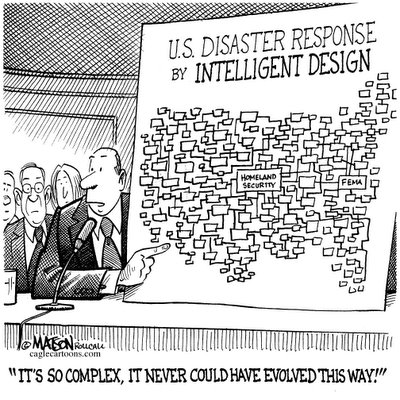 This is directly out of the "Centurymarks" section of The Christian Century (Nov. 15, 2005): "Also testifying in the intelligent design court case in Pennsylvania was John Haught, Georgetown University theology professor, who argued that science asks how whereas religion asks why. He noted that there are different ways of explaining boiling water. One could say that water boils due to rapid vibration of water molecules (the how question). Or one could say that it boils because someone desires a cup of tea. Both are legitimate accounts. But it is a mistake to bring up the subject of wanting tea when studying molecular movement, just as it is wrong to say 'It's the molecular movement' rather than 'I want tea'." (York Daily Record, October 1)
This is directly out of the "Centurymarks" section of The Christian Century (Nov. 15, 2005): "Also testifying in the intelligent design court case in Pennsylvania was John Haught, Georgetown University theology professor, who argued that science asks how whereas religion asks why. He noted that there are different ways of explaining boiling water. One could say that water boils due to rapid vibration of water molecules (the how question). Or one could say that it boils because someone desires a cup of tea. Both are legitimate accounts. But it is a mistake to bring up the subject of wanting tea when studying molecular movement, just as it is wrong to say 'It's the molecular movement' rather than 'I want tea'." (York Daily Record, October 1)It would seem that if public schools could stick to the "how" of things and faith communities do their job of establishing "why", we would all receive a very well-rounded education. Apparently, for some, the "why" of evolution threatens their "how" and the "how" of evolution threatens the others' "why", the meaning behind evolution. Which would indicate a certain amount of fear on both parts, a powerful force which influences most of us, believer or not. But we're all so busy being passionately gripped by our own point of view (another sign of fear) and poking fun at others (an attempt to assuage the fear) that we're not available to listen compassionately to those whose fears rankle our own.
We're all guilty of fundamentalistic thinking: right and wrong, black and white, "us" and "them", absolutely sure ours is the way. There is a choice that needs to be made but it's the one between loving, forgiving, and not. And I know that on any given day I could do much better at those, that I always fall short, that I am more of a goat than a sheep (all wisecracks, refer yourselves to the gospel of Matthew, ch. 25).
The only intelligent response is not more headgames, more jokes, more expert research or knowledge, but love and forgiveness. And you don't have to believe in God to be capable of that. But you do have to be capable of loving someone or something else more than you love yourself. Anyone can love as much as they are loved in return; some get by with doing less. But if you really want to change things, love more. Henry David Thoreau said, "There is no remedy for love but to love more."
How can I love more and why is that a needful thing for me to do? This is our mission as human beings living in community.

3 comments:
This is a beautiful piece—I love the wisdom and sentiment behind it. I would add something to your love and forgiveness argument, though. I think it’s impossible to love that which we don’t understand except in a vague, superficial way. Meaningful love, the kind of love that changes the world by crossing beyond words into action, comes from compassion, a willingness to see other points of view, and confidence that there is more than one right answer (which you illustrated beautifully in the boiling water example).
I would also add that humor is key to this endeavor. One major flaw I see with fundamentalists and True Believers is their inability to laugh at themselves. They can allow no chink in their armor and therefore will never consider revising their position. I think we should always be questioning our assumptions—and laughing about them is one of the best ways to do that.
---And by "fundamentalists" I do mean left and right.
I guess I should have been more explicit in my usage of the word "love". I like the definition given by the late M. Scott Peck: "the will to extend one's self for the purpose of nurturing one's own or another's spiritual growth" (from "The Road Less Traveled").
And I would agree that we all need more practice in laughing at ourselves. The trouble is that our jokes are aimed more toward those we don't understand rather than ourselves and our way of thinking.
Yes, there are left and right fundamentalists. The ones on the left would never admit to that, though.
Thanks for reading, Summer.
Post a Comment